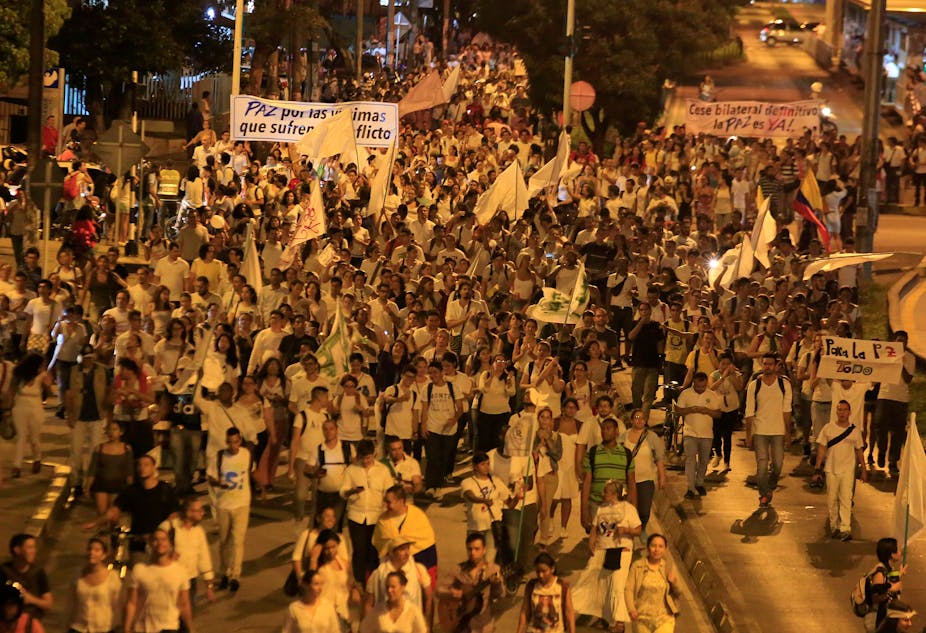President Juan Manuel Santos may have won the 2016 Nobel Peace Prize, but that won’t solve the uncertainty and political mess here in Colombia. Indeed, I fear that national reconciliation is even further away now. The recent No vote in the October 2 peace plebiscite was a reminder that, economic development and democratic processes aside, war and disagreement are ingrained in our nation.
In a 1910 conference celebrating Colombia’s centennial called “National Problems,” president Rafael Uribe Uribe said:
The Colombian people are the most polemicist in the world; their nature is prone to aggression, criticism, and jest. In all the world that I have travelled, I have never found a dreamier or more battle-happy race.
I’m reminded of this quote as I reflect on the Nobel prize and the results of the recent plebiscite, in which the Colombian people voted down, by a very narrow margin, a peace agreement with the FARC rebels. Are we a country that votes based on division and uncertainty? Do we value passion, arrogance, and vanity over logical argument?
What can be said of a people who, when faced with the possibility of reconciliation – of, at long last, national unity – decide instead to let the country drift along in a cloud of confusion and inconclusive political processes?
My colleague Maria Emma Willis has called Colombia “the country of political knots” – a place where disagreement is processed via tangled messes and violence, whether in the media or via the democratic process.
The No vote and the Nobel, though they fall on opposite sides of the peace spectrum, actually share one thing, which is that they empower the empowered - not the people.
Many pundits are doing political analysis right now: what happened? Why did we vote no to peace? What’s next? Does our president winning a Nobel prize actually change anything?
Short-term thinking
I’m a political scientist, but I’m also a Colombian citizen, and the ambiguity that has followed the No vote makes me think not just about politics but about the very nature of my country. What short-term thinking we demonstrated on October 2. How socially and culturally retrograde we’ve shown ourselves to be, unable to imagine a better world, a new reality. How vulnerable we’ve made ourselves – economically, emotionally, and physically.

The recent No vote has echoes in broader Latin American history. Obfuscation of the truth has a long trajectory in the region, one in which slogans and catchy turns of phrase are used to mask hatred and resentments: opaque language in the service of political ambitions.
From the 1,000 Day War (1899-1902) between the Liberal and Conservative parties to Sunday, October 2, 2016, Colombia has specialised in violence, opportunism and insider dealing, not compromise.
In the end, policy – like everyday life in this country – is schizophrenic: the absurd overlaps with the sagacious, the logical with the unheard of, reticence with bombast such that, in the end, we create only the illusion of a political and social system when in reality there’s just a one-dimensional reality without alternative or mediation.
It’s tough living in a knotty, tangled-up country, where making things harder is the easiest thing to do. Political dialogue since the No vote has rung hollow. Words can’t alter a social reality that includes classism, exclusion, marginalisation, disdain, and even apathy (note the widespread absenteeism on referendum day). These are all part of our political knot. The Nobel prize won’t change that.
Self-destructive potential
In the end, the October 2 plebiscite, rather than embodying democracy – which is the theory of popular consultation – actually subjugated it. The government used the vote to mask an insoluble, incredibly complex problem. The No result just shows the extremes that a people can embrace in political culture that promotes revenge, retaliation, and pugnacity, which says that such emotions are “the only alternatives” and that peace accords will just turn the FARC into another paramilitary force in a country that desperately needs less, not more, violence.
The result of the vote was to deligitimise the government of President Santos. This has been somewhat mitigated by the Nobel Prize, but what cannot be rolled back is that the plebiscite opened the door to for former president Àlvaro Uribe and his ilk, to gain new power. That’s awfully convenient for him, given the fact that the next election is less than two years away. Holding a referendum on peace was basically the beginning of the 2018 election season.
With its national “No!”, Colombia showed all its self-destructive potential. It showed a society whose principles are based on a longstanding relationship with extremism, polarisation, and the mentality that “if you’re not with me, you’re against me”. A citizenry that, despite the opportunities and possibilities that peace could have meant in leaving history behind, prefers to turn back the hands of time because, in Colombia, rancour is a political platform.
The October 2 No vote was not a triumph of democracy, a renewal of the electorate, or a mandate to start a new political order.
It was, simply, the latest chapter in a history of political agony in Colombia, a country of uncertainty, a land now locked in suspense of the unknown.
No Nobel prize can change that.

